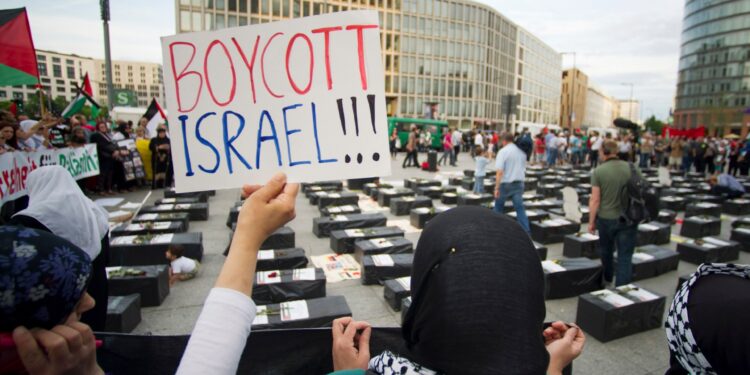The Israeli newspaper Haaretz said that the global response to Israel’s behavior in its war on the Gaza Strip is increasingly intensifying, which has led to a series of economic boycotts and diplomatic consequences.
The newspaper pointed out in a report that European countries such as Spain, Norway and Ireland officially recognized the Palestinian state, while other countries were considering taking similar steps, amid other steps that led to the Maldives preventing Israelis from entering the country, which exacerbated Israel’s isolation on the global scene.
These diplomatic setbacks – according to Haaretz – reflect the growing international impatience with Israel’s devastating war on the Gaza Strip.
The newspaper describes the recognition of the Palestinian state by many European countries as evidence of a noticeable shift in international sentiment, which undermines Israel’s diplomatic position.
Abolition of trade and business
The newspaper considered that the economic consequences accompanying the global reactions were dire and far-reaching, as Turkish President Recep Tayyip Erdogan imposed a boycott on the export of goods and raw materials to Israel.
As for France, it canceled Israel’s participation in the “Euro Satori 2024” arms and defense exhibition, which represents a major blow to the Israeli defense industry. War Cabinet Minister Benny Gantz described this decision as a “prize for terrorism” and urged France to reconsider it, according to the newspaper.
In the business sector, many major companies have severed their ties with Israel. Pri-A-Manje recently withdrew from the franchise agreement with the Israeli retail group Fox, citing the Gaza war as a force majeure event. The newspaper confirmed that the British chain faced increasing pressure from Pro-Palestinian groups, leading to protests in London.
The newspaper pointed out that McDonald’s – which is facing a global pro-Palestinian boycott – has reacquired its 225 Israeli branches, in an attempt to mitigate the violent reactions from its Muslim customers.
It is a move seen as an attempt to distance the global brand from its controversial presence in Israel, which has become increasingly associated with IDF soldiers and the war on Gaza.
High-tech sector
The advanced technology industry in Israel – which was once its pride and an important driver of its economy – has also begun to feel the effects of decline as a result of the war on the Gaza Strip and the accompanying global tensions and reactions.
Although it did not witness a direct boycott, the newspaper confirmed that foreign investors are being cautious, which has led to a decline in investment activity.
According to Central Bank of Israel Governor Amir Yaron, the capital raised in the second quarter of 2024 is expected to reach $3.5 billion, which is a significant increase over previous quarters, but not enough to offset the broader economic impact of what the sector was affected by.
High costs and government inaction
According to the newspaper, the boycott has exacerbated the economic crisis in Israel, the most prominent of which are as follows:
- The cost of living in Israel has increased, adding to existing economic pressures.
- El Al raised its ticket prices as foreign airlines halted flights to Israel.
- Shipping rates have increased due to regional threats.
- Real estate and product prices rose due to labor shortages.
Despite these challenges, the Israeli government’s response has been slow, according to Haaretz.
The current Israeli government has been criticized for its inaction and ineffective policies.
The newspaper believes that officials give vague and unconvincing answers when asked about measures aimed at reducing the rising costs of living.
The newspaper points out that as the global boycott movement gains momentum, Israeli consumers are preparing for more economic pressure, and that the government’s inability to effectively address these issues leaves the country vulnerable to deeper financial problems in the coming months.



